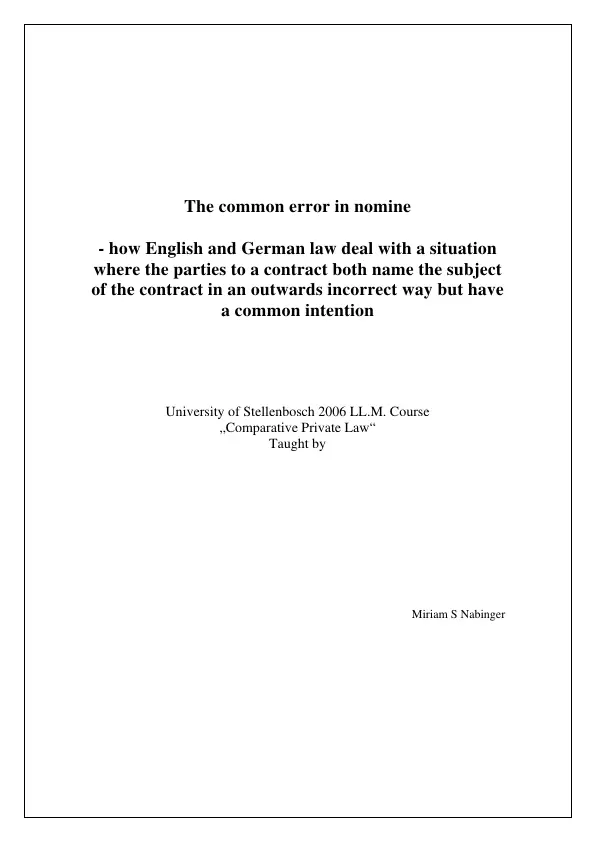In this paper it will be made an effort to compare the German and English position in the situation where two parties to a contract have actually reached consensus but gave their agreement an outwards wrong expression by using a wrong name for the subject-matter of contract.
In a first step, the general positions in both jurisdictions will be presented and afterwards, as a practical application of the functionalist approach, it will be sought to determine if the English law would have reached the same outcome if it would have to decide a prominent German court decision by reference to comparable English cases.
Inhaltsverzeichnis (Table of Contents)
- Introduction
- German Law
- Requirements for a valid contract
- The method of the interpretation of a contract (Auslegung) according to §§ 133, 157 BGB
- The distinction between the method of interpretation (§§ 133, 157 BGB) and recission (§§ 142 et seq, 119 BGB) as a remedy
- Falsa demonstratio non nocet
- English law
- Requirements for a valid contract
- The method of interpretation of a contract
- The distinction between the method of interpretation and recission
- The common identical error as to the content of the declaration (error in nomine) in German and English law
- The functionalist test of similar or different results in German and English Law
- German law: The Haakjöringsköd case
- English law's solution to similar cases
- Conclusion from both national approaches in practice
- Conclusion
Zielsetzung und Themenschwerpunkte (Objectives and Key Themes)
This paper aims to compare the German and English legal positions in cases where two parties to a contract reach an agreement but make a mistake in the outward expression of their agreement by using an incorrect name for the subject matter of the contract. The paper will first present the general positions in both jurisdictions and then apply a functionalist approach to determine if English law would reach the same outcome as a prominent German court decision when considering comparable English cases.
- Error in nomine: The specific situation where both parties make a mistake about the subject matter of a contract by using an incorrect name for it.
- Contractual interpretation: How German and English law interpret contracts, including the role of subjective intent, objective standards, and good faith.
- Functionalist approach: Comparing legal systems based on their practical outcomes and determining whether they would reach similar conclusions in comparable cases.
- Will theory and declaration theory: Different approaches to understanding contractual obligations based on subjective intent or objective declarations.
- Falsa demonstratio non nocet: The principle that a false description does not invalidate a contract if the thing or person has been sufficiently identified.
Zusammenfassung der Kapitel (Chapter Summaries)
- Introduction: Introduces the topic of the paper and outlines its objectives, which are to compare the German and English legal positions on contracts where parties make a mistake in the subject matter's description. The paper will use a functionalist approach to analyze a prominent German court decision.
- German Law: Explains the requirements for a valid contract under German law, including the need for two declarations of will, legal capacity, the correct form, and the absence of illegal purposes. It then delves into the interpretation of contracts under §§ 133 and 157 BGB, which emphasize both subjective intent and objective standards like good faith and business custom.
- English law: This chapter presents the requirements for a valid contract under English law and discusses the method of interpretation, highlighting potential differences in approach compared to German law.
- The common identical error as to the content of the declaration (error in nomine) in German and English law: This chapter examines the specific situation of "error in nomine" where both parties make a mistake regarding the subject matter of the contract, exploring how German and English law address this issue.
- The functionalist test of similar or different results in German and English Law: This chapter explores the practical application of the functionalist test by comparing the outcomes of German and English legal systems in cases involving similar facts. It specifically examines the Haakjöringsköd case in German law and compares it to comparable English cases to see if they reach similar conclusions.
Schlüsselwörter (Keywords)
This paper explores the topic of "error in nomine" within the context of German and English contract law, focusing on the interpretation of contracts, the role of subjective intent and objective standards, and the functionalist approach to comparing legal systems. Key terms include: contract, error, mistake, interpretation, subjective intent, objective standards, good faith, business custom, functionalist approach, will theory, declaration theory, falsa demonstratio non nocet, Haakjöringsköd case, and comparative law.
Frequently Asked Questions
What is "error in nomine" in contract law?
An "error in nomine" occurs when two parties agree on the subject matter of a contract but use an incorrect name to describe it in their declaration.
What does "falsa demonstratio non nocet" mean?
This legal principle states that a false description does not harm or invalidate a contract as long as the parties' true intention regarding the object is clear.
How does German law interpret contracts in case of an error?
Under §§ 133 and 157 BGB, German law emphasizes the true subjective intent of the parties over the literal wording, provided both parties understood the same thing.
What is the Haakjöringsköd case?
It is a famous German court decision where parties contracted for "Haakjöringsköd" (shark meat) believing it meant whale meat. The court ruled that the contract for whale meat was valid because that was the mutual intent.
Does English law reach the same results as German law?
The paper uses a functionalist approach to determine if English law, despite different methods of interpretation, would achieve a similar practical outcome in cases of mutual error.
- Quote paper
- Miriam Nabinger (Author), 2006, The common error in nomine, Munich, GRIN Verlag, https://www.grin.com/document/87047



